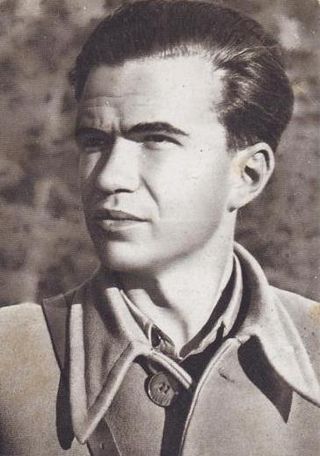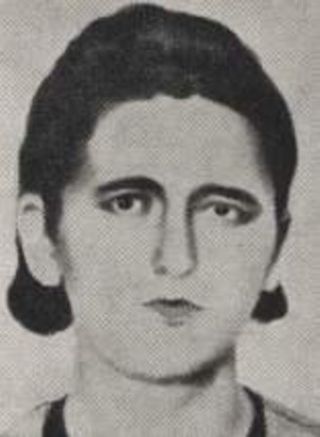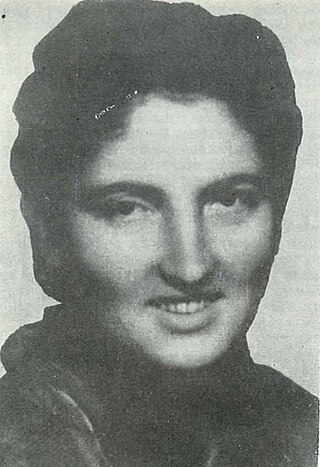
Veljko Vlahović was a Montenegrin politician and career army officer. He was one of the prominent members of the Montenegrin branch of the Yugoslav Communist Party from 1935 which established the SFR Yugoslavia following World War II. He studied in Belgrade, Prague, and the Sorbonne, and finished his postgraduate studies in Moscow. He fought in the Spanish Civil War and was active in organizing the Communist Youth League of Yugoslavia (SKOJ).

The Order of the People's Hero or the Order of the National Hero, was a Yugoslav gallantry medal, the second highest military award, and third overall Yugoslav decoration. It was awarded to individuals, military units, political and other organisations who distinguished themselves by extraordinary heroic deeds during war and in peacetime. The recipients were thereafter known as People's Heroes of Yugoslavia or National Heroes of Yugoslavia. The vast majority was awarded to partisans for actions during the Second World War. A total of 1,322 awards were awarded in Yugoslavia, and 19 were awarded to foreigners.
Velimir Škorpik was a Croatian and Yugoslav Partisan naval officer and commander of several early Partisan naval units. After graduating from the Naval Academy in 1940, Škorpik began his naval career as an officer in the Royal Yugoslav Navy. Following the Axis invasion of Yugoslavia in April 1941 which saw the rapid collapse of the KM, Škorpik joined the Armed Forces of the Independent State of Croatia, serving as a harbour officer in Makarska. After coming into contact with local communist operatives, he eventually defected to the Partisans in late 1942.

Ivan Ribar, known as Ivo Lola or Ivo Lolo, was a Yugoslav communist politician and military leader of Croatian descent. In the 1930s, he became one of the closest associates of Josip Broz Tito, leader of the Yugoslav Communist Party. In 1936, Ribar became secretary of the Central Committee of SKOJ. During World War II in Yugoslavia, Ribar was among the main leaders of the Yugoslav Partisans and was a member of the Partisan Supreme Headquarters. During the war, he founded and ran several leftist youth magazines. In 1942, Ribar was among the founders of the Unified League of Anti-Fascist Youth of Yugoslavia (USAOJ). He was killed by a German bomb in 1943 near Glamoč while boarding an airplane for Cairo, where he was to become the first representative of Communist Yugoslavia to the Middle East Command.

Josip Kraš was a Croatian communist and partisan who died in World War II and was proclaimed a People's Hero of Yugoslavia.

Anka Butorac was a Croatian communist who died in World War II and was proclaimed a People's Hero of Yugoslavia.

Orders, decorations, and medals of the Socialist Federal Republic of Yugoslavia were created during the Second World War and used throughout the existence of the Socialist Federal Republic of Yugoslavia. The first decorations were created by AVNOJ on August 15, 1943 and included the Order of the People's Hero, Order of the People's Liberation, Order of the Partisan Star, Order of the Brotherhood and Unity, Order for Bravery and Medal for Bravery. By 1960 the total number of decorations increased to 42 and consisted of 35 orders, 6 medals and 1 commemorative medal. The designers of the Yugoslav orders and medals were Antun Augustinčić and Đorđe Andrejević Kun.

The Socialist Alliance of Working People of Yugoslavia (SSRNJ), known before 1953 as the People's Front of Yugoslavia (NFJ), was the largest and most influential mass organization in SFR Yugoslavia from August 1945 through 1990. It succeeded the Unitary National Liberation Front, which gathered and politically backed anti-fascist layers of society throughout Yugoslavia since 1934. By 1990, SSRNJ's membership was thirteen million individuals, including most of the adult population of the country. Together with the League of Communists of Serbia, it merged in July 1990 to form the Socialist Party of Serbia.
Orders and medals were awarded in the Federal Republic of Yugoslavia between 1998 and 2006. Before the 1992 Breakup of Yugoslavia, the Orders and medals of the Socialist Federal Republic of Yugoslavia were awarded. Some of the old pre-1992 SFRY orders and medals were retained by FR Yugoslavia, while some new were established. Orders and medals of FR Yugoslavia were regulated by the Law on Decorations of Federal Republic of Yugoslavia adopted on 4 December 1998. Between 1992 and 1998, no decorations were awarded in FR Yugoslavia.

Sergej Mašera was a naval Lieutenant of the Yugoslav Royal Navy. At the end of the April War, Mašera, along with his fellow Lieutenant Milan Spasić, scuttled the destroyer Zagreb in the Bay of Kotor near Tivat to prevent its capture by the Italian Royal Navy. Both lieutenants died in the explosion, and were posthumously made members of the Order of the People's Hero.

Milan Spasić was a naval Lieutenant of the Royal Yugoslav Navy. During the April War, Spasić, along with his fellow Lieutenant Sergej Mašera, scuttled the destroyer Zagreb in the Bay of Kotor near Tivat to prevent it from falling into the hands of the Italian Royal Navy. Both Spasić and Mašera died in the scuttling.

The Order of the War Banner was a military order of honor and the 7th highest state decoration of the both Socialist Federal Republic of Yugoslavia (SFRY) and Serbia and Montenegro. It was awarded to military commanders who show personal courage or self-sacrifice during the war.

Božidarka "Kika" Damjanović-Marković was a Yugoslav Partisan commander as a participant in the Second World War in Yugoslavia.
Xhevdet Doda was a Yugoslavian teacher by profession who was active in the resistance against German occupation in Kosovo during World War II. Doda was member of the Yugoslav Partisans and member of the Liberation Council of Kosovo. He was arrested by Gestapo in 1944 and killed in the Mauthausen concentration camp (Bicerk-1). He was posthumously proclaimed People's Hero of Yugoslavia in 1973.
Nisim Albahari, was a Yugoslav Partisan, People's Hero of Yugoslavia and political leader in the Socialist Republic of Bosnia and Herzegovina.

Đorđije "Đoko" Pavićević was an officer of the Royal Montenegrin Army and Royal Yugoslav Army who fought in World War I and in World War II as a member of the Yugoslav Partisans, and later a colonel of Yugoslav People's Army. He was the oldest recipient of the Order of the People's Hero.
Order of Military Merits was a state decoration awarded in Yugoslavia, divided into three classes. It was awarded to commanders of units and civilians serving in the Yugoslav People's Army, as well as individuals in trade unions or other organizations with outstanding contributions and accomplishment of tasks of special immediate importance for national defense.

This electoral term of the Central Auditing Commission was elected by the 5th Congress of the Communist Party of Yugoslavia in 1948, and was in session until the gathering of the 6th Congress in 1952.

This electoral term of the Central Auditing Commission was elected by the 6th Congress of the League of Communists of Yugoslavia in 1952, and was in session until the convocation of the 7th Congress in 1958.

This electoral term of the Central Auditing Commission was elected by the 7th Congress of the League of Communists of Yugoslavia in 1958, and was in session until the gathering of the 8th Congress in 1964.
















